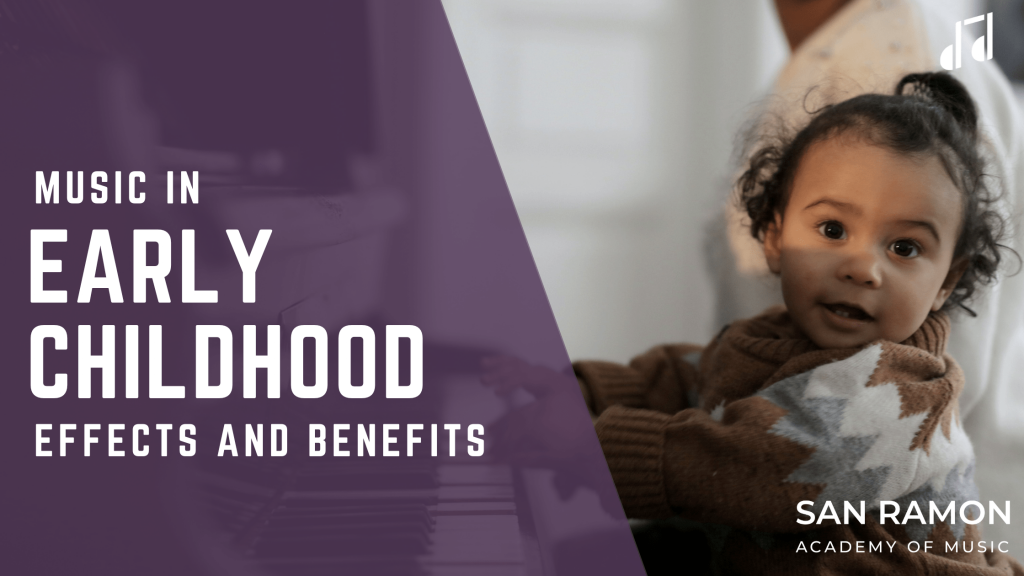Uncategorized
Music In Early Childhood: Effects and Benefits
Music, a universal language, holds unparalleled power in shaping the developmental landscape of young minds. From the earliest stages of infancy through the pivotal years until the age of seven, its presence orchestrates a myriad of benefits that profoundly influence cognitive, emotional, and social growth.
At San Ramon Academy of Music, we unravel the enchanting effects of music across three critical developmental stages: infancy (birth to 2 years), toddlers (2-4 years), and early childhood (5-7 years).
1. Melodic Beginnings: Birth to 2 Years
Neural Harmony: Stimulating Infant Development
From the moment a child is born, music weaves its enchantment, igniting a symphony of neural connections. Melodic tunes and soothing rhythms have a remarkable impact on infants, fostering cognitive development. Studies reveal that exposure to music at this stage enhances auditory processing, lays the groundwork for language acquisition, and nurtures early memory formation.
Emotional Lullabies: Cultivating Bonds and Regulation
Music acts as an emotional anchor for infants, offering comfort and fostering secure attachment with caregivers. Lullabies and gentle melodies serve as emotional regulators, soothing infants and aiding in the development of self-soothing mechanisms. These musical interactions create a nurturing environment, fostering trust and emotional resilience.
2. Rhythmic Exploration: Ages 2 to 4
Kinetic Symphony: Fostering Motor Skills and Coordination
Toddlers embark on a journey of discovery through movement guided by music. Rhythmic beats and playful tunes stimulate motor skills, refining coordination and balance. Engaging in musical activities like dancing or clapping along to songs enhances gross and fine motor skills, laying a robust foundation for physical development.
Expressive Avenues: Language Development and Creativity
The toddler years witness a blossoming of language skills, and music serves as a catalyst for linguistic development. Rhymes, repetitive lyrics, and interactive songs enhance vocabulary, encourage speech, and promote creativity. Musical activities aid in the exploration of sounds and words, fostering linguistic confidence and fluency.
3. Harmonic Growth: Ages 5 to 7
Cognitive Crescendo: Enhancing Cognitive Abilities
As children transition into early childhood, music continues to sculpt their cognitive landscape. Engaging with music refines attention spans, boosts memory, and cultivates critical thinking skills. Learning to play instruments or read musical notation stimulates the brain, nurturing cognitive flexibility and problem-solving abilities.
Ensemble Cadence: Cultivating Social Skills
Collaborative musical experiences become a gateway to social development. Group performances, singing in choirs, or playing in ensembles foster teamwork, cooperation, and empathy. Sharing musical experiences nurtures social bonds, teaching children the value of collaboration and respect for others’ contributions.
San Ramon Academy of Music: Nurturing Musical Journeys
At San Ramon Academy of Music, we recognize the transformative potential of music at each stage of early childhood development. Our tailored programs and expert guidance create an immersive musical environment where children explore, learn, and flourish. Through interactive sessions, exposure to diverse musical genres, and individualized attention, we pave the way for holistic growth and musical mastery.
The Harmonious Conclusion: Embracing Music’s Influence
The presence of music from birth to the age of seven orchestrates a symphony of development, nurturing cognitive, emotional, and social facets of a child’s growth. San Ramon Academy of Music celebrates the enchanting effects of music, inviting parents and caregivers to embrace this transformative influence. Let music be the guiding melody that enriches the journey of childhood, fostering a harmonious path towards holistic development and lifelong appreciation for the art.
Learn more about our 10-Week Group Courses for early childhoon by contacting us here!





